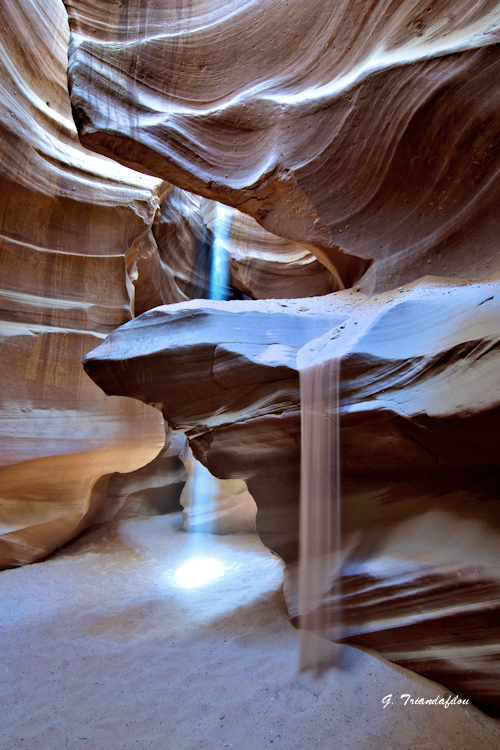DX or FX Dilemma
Nov 26, 2018 22:19:49 #
Get an fx camera and sell your Dx lenses. But a 24-70 and a 70-300 nikon Fx lens and then branch out from there
[ quote=rbmartiniv]I've been using a Nikon D7000 (Dx format) for about 8 years and have accumulated several expensive lenses. I'm ready for a new camera and am interested in possibly one in the Fx format. I understand I can still use my Dx lenses but the Fx camera will automatically crop the frame to the Dx format. If I never buy any more lenses then it would be a stupid move, buying an Fx format camera and using it in a Dx format. At this time I don't know what other lenses, if any, I will want to buy (I'm 74 years young). If I buy more lenses I would buy Fx format of course. I would appreciate some advice, especially from anyone who has made a similar jump (from Dx to Fx). Thank you in advance.[/quote]
[ quote=rbmartiniv]I've been using a Nikon D7000 (Dx format) for about 8 years and have accumulated several expensive lenses. I'm ready for a new camera and am interested in possibly one in the Fx format. I understand I can still use my Dx lenses but the Fx camera will automatically crop the frame to the Dx format. If I never buy any more lenses then it would be a stupid move, buying an Fx format camera and using it in a Dx format. At this time I don't know what other lenses, if any, I will want to buy (I'm 74 years young). If I buy more lenses I would buy Fx format of course. I would appreciate some advice, especially from anyone who has made a similar jump (from Dx to Fx). Thank you in advance.[/quote]
Nov 27, 2018 03:54:29 #
BurghByrd
Loc: Pittsburgh
Let's think about the differences. The DX sensor size for Nikon is 24x16mm and 36x24mm for the FX sensor. That's a 125% change in area! Much more information can be captured for the larger sensor at any given stage of manufacturing development (pixel density). If you don't blow images up to a large print size or don't crop to a smaller area the difference would be hard to see given current pixel density capabilities. On the question of lenses, DX lenses are designed to cover the DX sensor and not the larger FX sensor. The diagonal measure for each of these is 28.8 mm for the DX and 43.3 mm for the FX thus a lens designed for DX will cast a circular image to cover a 29 mm diameter at the sensor but that will not cover the >43mm diameter of the FX sensor consequently the image on an FX sensor would have to be cropped down to be useful. The FX lenses designed to cast a >43 mm diameter will of course also cover the smaller DX sensor although the image captured would be like a crop capturing ~45% of the FX image area. This is why I moved to FX cameras when they became available; the fact that I already had lenses from my film cameras at the time helped. Today, if I were considering changing I'd have to consider the Z format cameras being pushed by the manufacturers. I haven't investigated this much but I think what might be behind this is the functionality that is now in the lens (electronic diaphragm, focus motor etc.) that used to be in the body consequently the opportunity to simplify the camera body but there's probably more than that involved. All that said, which is going to give you more enjoyment taking pictures?
Nov 27, 2018 09:33:36 #
hookedupin2005
Loc: Northwestern New Mexico
rbmartiniv wrote:
I've been using a Nikon D7000 (Dx format) for abou... (show quote)
I would jump up to the D500... No new lenses to buy, and a great camera.
Nov 27, 2018 11:50:48 #
Nov 27, 2018 12:07:13 #
IDguy
Loc: Idaho
Amazing how many flat wrong assertions you get on UHH.
Nikon cameras only revert to DX automatically when you put a DX lens on them if you have the menu choice set to do that. It might confuse people who don’t RTFM because it might be the Nikon default.
My D800 has five image areas you can choose to use with any DX lens, from DX to FX. Other than DX they might vignette unacceptably over some of the image area choices and zoom settings. You have to check each lens to see what you might like.
Nikon cameras only revert to DX automatically when you put a DX lens on them if you have the menu choice set to do that. It might confuse people who don’t RTFM because it might be the Nikon default.
My D800 has five image areas you can choose to use with any DX lens, from DX to FX. Other than DX they might vignette unacceptably over some of the image area choices and zoom settings. You have to check each lens to see what you might like.
Nov 27, 2018 12:10:52 #
IDguy
Loc: Idaho
BurghByrd wrote:
Let's think about the differences. The DX sensor ... (show quote)
Put another way the image area of the FX sensor is over 200% of the DX sensor. Yes, the ADDITIONAL area is 125%.
Nov 27, 2018 12:12:51 #
IDguy
Loc: Idaho
Bluetick wrote:
If you are convinced that full frame is the way you want to go, don’t forget the fact that Nikon has just introduced its new “Z” line of mirrorless full frame cameras; the Z6 and Z7. They are adding a Z line of lenses as the lens mount is different from the standard Nikon mount. They also have an adapter ($250) that will allow one to use current Nikon lenses, without loss of automatic functions. Check out www.nikonusa.com. P.S. I am in the same quandary 🙄
I believe the adapter is still $150 if purchased with camera through the end of the year.
Nov 27, 2018 12:24:00 #
rbmartiniv wrote:
I've been using a Nikon D7000 (Dx format) for abou... (show quote)
Several years ago, I made the same jump. From the D300s to the D800. Most of my lenses were DX, but a few were FX.
I made the decision to trade-in all my DX lenses and purchase FX lenses. the local camera store gave me 40 to 60 % of original price towards the purchase of the FX lenses. There were five altogether. As I look back, I am glad I did it.
Nov 27, 2018 12:25:39 #
jcboy3 wrote:
...use the money to travel while you still can.
Do you know something he doesn't know?

Nov 27, 2018 18:50:09 #
twillsol wrote:
Several years ago, I made the same jump. From the D300s to the D800. Most of my lenses were DX, but a few were FX.
I made the decision to trade-in all my DX lenses and purchase FX lenses. the local camera store gave me 40 to 60 % of original price towards the purchase of the FX lenses. There were five altogether. As I look back, I am glad I did it.
I made the decision to trade-in all my DX lenses and purchase FX lenses. the local camera store gave me 40 to 60 % of original price towards the purchase of the FX lenses. There were five altogether. As I look back, I am glad I did it.
+1
Nov 27, 2018 20:29:04 #
BurghByrd
Loc: Pittsburgh
Percent change is the difference divided by the reference, i.e. ( (36x24)-(24x16))/(24x16)=1.25
Nov 27, 2018 23:40:57 #
nadelewitz wrote:
Okay, so it won't vignette, but you lose image. So why not just stick with all-DX lenses and bodies?
Vastly better image quality especially in low light situations.
Nov 28, 2018 00:51:51 #
rbmartiniv wrote:
I've been using a Nikon D7000 (Dx format) for abou... (show quote)
In 2006 I purchased a new Nikon D200 or dx camera and eventually purchased 3 or 4 lenses for it. In 2014 I bought a used Nikon D800 and slowly purchased FX lenses for it. However, some great shots can still be made with your DX lenses on the D800 and in full frame mode as well. Using the Tokina 11-16mm lens in FX mode can be done WITHOUT vignetting if shooting at 16mm focal length. With this combination I was able to create this 5 photo HDR shot of Upper Antelope Canyon that is very sharp and detailed which btw has also been chosen for the inside cover of the Corel Paintshop Pro 2019 software box! I still have and use the D200 (mostly as a back up camera). My only regret moving from DX to FX is that I did not do it sooner! It's as if I went from driving a VW bug to driving a Cadillac or Lexus. I am 64 years young.

Nov 28, 2018 11:35:21 #
Nov 28, 2018 15:22:21 #
If you want to reply, then register here. Registration is free and your account is created instantly, so you can post right away.





